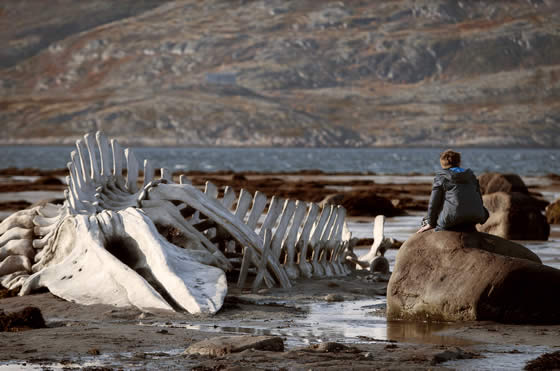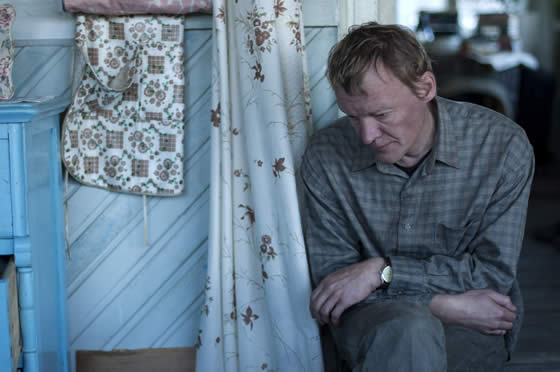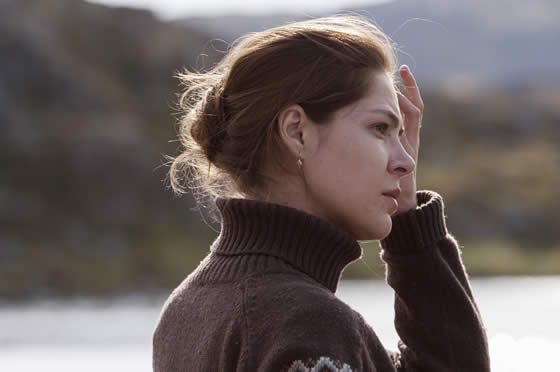 LEVIATHAN, one of the nine films in the Academy Awards shortlist for the Best Foreign Language Film Oscar, is the latest drama from Andrey Zvyagintsev, the acclaimed director of The Return (Venice Film Festival Golden Lion winner and Golden Globe nominee). In LEVIATHAN, Kolia (Alexeï Serebriakov) lives in a small fishing town near the stunning Barents Sea in Northern Russia. He owns an auto-repair shop that stands right next to the house where he lives with his young wife Lilya (Elena Liadova) and his son Roma (Sergueï Pokhodaev) from a previous marriage.
LEVIATHAN, one of the nine films in the Academy Awards shortlist for the Best Foreign Language Film Oscar, is the latest drama from Andrey Zvyagintsev, the acclaimed director of The Return (Venice Film Festival Golden Lion winner and Golden Globe nominee). In LEVIATHAN, Kolia (Alexeï Serebriakov) lives in a small fishing town near the stunning Barents Sea in Northern Russia. He owns an auto-repair shop that stands right next to the house where he lives with his young wife Lilya (Elena Liadova) and his son Roma (Sergueï Pokhodaev) from a previous marriage.
The town’s corrupt mayor Vadim Shelevyat (Roman Madianov) is determined to take away his business, his house, as well as his land. First the Mayor tries buying off Kolia, but Kolia unflinchingly fights as hard as he can so as not to lose everything he owns including the beauty that has surrounded him from the day he was born. Facing resistance, the mayor starts being more aggressive…..
Bijan Tehrani: What motivated you to make LEVIATHAN?
Andrey Zvyagintsev: In 2004, there was a tragic story about plight of one small person in resistance to the governmental structure and the powers that be. I don’t know  if I should tell you the whole story but I think that will be the right thing to do; there were tremendous injustices, a person got into a bulldozer, took down a government building and while inside the bulldoze he took his own life. This was his protest; this was his show of persona will and his fight against injustice. I’ve heard of this story when I was here in the United States working on a short novel and I was introduced to this story by Knock Brownie and she was my navigator and my assistant and this story triggered me to bring it to the screen. So you can say that this was the spring that started the whole production of Leviathan.
if I should tell you the whole story but I think that will be the right thing to do; there were tremendous injustices, a person got into a bulldozer, took down a government building and while inside the bulldoze he took his own life. This was his protest; this was his show of persona will and his fight against injustice. I’ve heard of this story when I was here in the United States working on a short novel and I was introduced to this story by Knock Brownie and she was my navigator and my assistant and this story triggered me to bring it to the screen. So you can say that this was the spring that started the whole production of Leviathan.
BT: I think the film is interesting because when I look at it has this feel of well known Western films, and at the same time it had its roots in Russian storytelling, it is a mixture of the two in the way that the story is told.
AZ: I don’t find that resemblance in the film, but maybe because I am not too familiar with this genre.
BT: There is a theme of the man vs. the state, and forces that are trying to restrict freedom.
AZ: The movie is about a person, a human being standing up to the gigantic machine which is the government.
BT: I think the story of LEVIATHAN could apply to every person in every part of the world.
AZ: Absolutely, this is a Universal Story. Once in Toronto, I was being interviewed by a journalist from Mexico about LEVIATHAN and he said that if you substituted vodka with tequila than the whole story could take place in Mexico.
 BT: How did you go about casting the film?
BT: How did you go about casting the film?
AZ: It took a long time, we interviewed actors and we tried different actors and tried again and in the end this was the result, when it all comes to fruition.
BT: Did you rehearse a lot with the actors?
AZ: We were rehearsing as we were shooting, in a 12 hour filming day, we might have covered about 3 scenes, so we did invest a lot of time into rehearsals. This only applies to films that had to do with serious acting; also in relation to the scenes where the actors are drinking and acting drunk. Discussing these scenes we all came to a mutual agreement that in order to achieve the drunken behavior realistically our actors would actually have to be drunk during the shooting. The only actor who refused this arrangement was the actor who played the role of the mayor.
BT: How did you come up with the visual style of the film?
AZ: It took us three months to find the location. We had a mutual agreement that Russia should be the central location, and it had to be a place in Russia that is known to everybody. We visited 75 different towns, small provincial little towns surrounding Moscow, We were not able to find that exact location that we wanted and in the end we stopped our search and sat down in our office and continued the search using pictures from the Google Maps. Out Art director for the film had found a couple of pictures of a River path and we drove to River and the place was majestic and that became the setting for the movie. It’s just our regular process, when you are filming a particular scene, you just figure out the placement of the camera.
BT: What do you think are the chances of LEVIATHAN competing at the Academy Awards?
AZ: From the whole world there are 76 countries who submitted their best work, it is a very big competition, all I can think right now is that it all depends on faith, and our faith is in the hands of the members of the academy; I try not to think about it.

